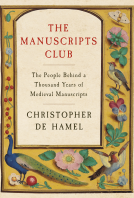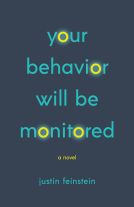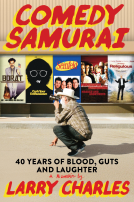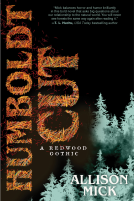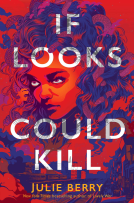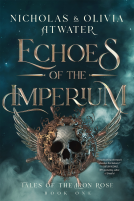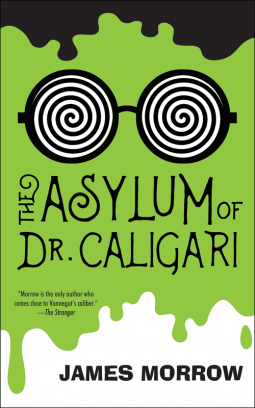
The Asylum of Dr. Caligari
by James Morrow
This title was previously available on NetGalley and is now archived.
Send NetGalley books directly to your Kindle or Kindle app
1
To read on a Kindle or Kindle app, please add kindle@netgalley.com as an approved email address to receive files in your Amazon account. Click here for step-by-step instructions.
2
Also find your Kindle email address within your Amazon account, and enter it here.
Pub Date Jun 20 2017 | Archive Date Sep 06 2017
Description
—Jeffrey Ford, author of A Natural History of Hell
It is the summer of 1914. As the world teeters on the brink of the Great War, a callow American painter, Francis Wyndham, arrives at a renowned European insane asylum, where he begins offering art therapy under the auspices of Alessandro Caligari—sinister psychiatrist, maniacal artist, alleged sorcerer. And determined to turn the impending cataclysm to his financial advantage, Dr. Caligari will—for a price—allow governments to parade their troops past his masterpiece: a painting so mesmerizing it can incite entire regiments to rush headlong into battle.
The Asylum of Dr. Caligari is a timely tale that is by turns funny and erotic, tender and bayonet-sharp—but ultimately emerges as a love letter to that mysterious, indispensable thing called art.
A Note From the Publisher
Advance Praise
Selection - io9 Summer Reading List
Amazon Best Books of the Month: Editor’s Picks
Barnes & Noble Best Science Fiction and Fantasy Books of June
Best Summer Books, Campus Circle
Feature, Barnes & Noble.com Week's New Sci Fi and Fantasy Books
“Entrancing prose enhances the unusual plot of Morrow’s successful melding of history and fantasy.”
—Publishers Weekly
“James Morrow explores ideas with visionary audacity and a satirical (yet nonetheless disturbing) bent perhaps unequaled since Philip José Farmer’s Riverworld series—as if directed by Andrei Tarkovsky.”
—See the Elephant
“It’s a rich and wonderful mash-up of political satire, psychological fairytale and German Expressionist horror story . . . There’s a gorgeous edge to Morrow’s writing, a sense of fun and irreverence that never detracts from the dark jeopardy at the heart of the story. 10/10 stars.”
—Starburst
“[Morrow] is a crafty wordsmith who likes to hone in on poseurs and pretensions . . . Readers who are fond of wry esoteric musings will not be disappointed.”
—Diabolique
“As is always the case with Morrow, he keeps the ride interesting and at times painfully funny.”
—Locus
“Unrestrained by modern sensibilities of restraint, Morrow creates some beautiful prose . . . Well written, inventive, and a great throwback to classics of the genre.”
—Popverse
“The Asylum of Dr. Caligari is an inventive homage to and extrapolation of concepts in The Cabinet of Dr. Caligari. At less than 200 pages, it’s also a pithy commentary on the power of art and the folly and hysteria of war.”
—Seattle Post-Intelligencer
“A satirical, thought provoking, and stimulating novella.”
—New York Journal of Books
“No one does history-meets-the-fantastic like Morrow. The Asylum of Dr. Caligari is a great example—Impressionism versus expressionism, psychology in the asylum of ‘dreams,’ the weaponization of art, big laughs and big ideas, a wild imagination, and smooth, subtle writing.”
—Jeffrey Ford, author of A Natural History of Hell
“The Asylum of Dr. Caligari is a fast, funny book . . . Brilliantly walking the line, its zippy energy camouflages a surprisingly powerful resonance. It’s yet another seriocomic triumph from one of the genre’s best satirists.”
—Christopher East
“I was reminded time and again of some horror greats including Dracula and Frankenstein."
—The Booklover's Boudoir
[STARRED REVIEW]“This is an erudite, fun book that can be enjoyed on many levels; it succeeds as a satire of geopolitics and warmongering elites, as a comic fantasy, and as a pastiche of the 1920 film that appears on so many fans’ ‘best of’ lists.”
—Foreword
“The Asylum of Dr Caligari is exquisite, inventive madness of epic proportions, laced with wicked humour.”
—Strange Alliances
“The Asylum of Dr. Caligari is laugh out loud funny, even as it tosses about ideas surrounding perhaps our most serious and vile aspects of existence: war and indoctrination to war.”
—Speculition
“The story makes points about the effect of art on humanity and its relevance to society, but it’s also terrifying, with dark humor and a clever tone.”
—RevolutionSF
“The Asylum of Dr. Caligari succeeds in being at once a brilliant rendering of an antique spooky passion play and a timeless lesson about megalomaniacs, art, science and love.”
—Locus
“This is a satire for the ages, a skillful blending of the history of World War One, and the fantastical realm of alchemy and magic . . . The wry, tongue-in-cheek amusement of Morrow’s writing reminds me of reading Jonathan Swift’s ‘A Modest Proposal.’”
—The San Francisco Review of Books
“It really
reminds me of Wes Anderson's Grand Budapest Hotel . . .
sumptuous and philosophical, thought-provoking as well as just good fun."
—Art District Radio
“A perfect fit for people who are not just interested in
fantasy, but also history, art, geography and linguistics.”
—New Books Network
Praise for James Morrow
“James Morrow is a wildly imaginative and generous novelist who plays hilarious games with grand ideas.”
—New York Times Book Review
“I am so besotted with James Morrow’s talent that I cannot find a word big enough to deify it.”
—Harlan Ellison
“James Morrow is an original—stylistically ingenious, savagely funny, always unpredictable.”
—Philadelphia Inquirer
“Writing a brand of masterfully understated comic prose all his own, Morrow is a genius.”
—Booklist
“America's best satirist.”
—James Gunn, editor of The New Encyclopedia of Science Fiction
“Morrow’s satire is funny and sad, and increases our ability to see the little bits of truth in our own world.”
—Denver Post
“James Morrow demonstrates that he may be the Jonathan Swift of the late 20th century.”
—Des Moines Sunday Register
“Morrow is even more inventive than Vonnegut.”
—Cleveland Plain Dealer
“The man defines fantasy.”
—Chicago Tribune
“Morrow is the greatest kind of American author. ”
—The Stranger
Marketing Plan
Marketing and Publicity
· Advertising and co-op in national print, online outlets, and social media
· Promotion at major trade and genre conventions, including BEA, Readercon, the International Convention for the Fantastic in the Arts, and the World Fantasy Convention
· Features, interviews, and reviews targeting venues including the Washington Post, NPR, Los Angeles Times, New York Times, Chicago Tribune, and the San Francisco Chronicle
· Author appearance tour dates TBD
· Planned galley distribution and book giveaways to include NetGalley, Goodreads, Edelweiss, Tor.com, and additional online outlets
Available Editions
| EDITION | Other Format |
| ISBN | 9781616962654 |
| PRICE | $14.95 (USD) |
| PAGES | 192 |
Links
Average rating from 32 members
Featured Reviews
 Andrew E, Reviewer
Andrew E, Reviewer
Not many write as intelligent fiction as does Morrow. Mashing /psychiatry and film history in a compellingly different and fascinating novel is no small feat and Morrow pulls it off with aplomb. Read it!
 Megan G, Media/Journalist
Megan G, Media/Journalist
So thoroughly enjoyable it almost convinces me that the film industry would be justified in remaking the Hammer Horror classics. Well written, inventive, and a great throwback to classics of the genre.
 Gabrielle M, Media/Journalist
Gabrielle M, Media/Journalist
The Cabinet of Dr. Caligari is a deft little novel is a perfect fit for people who are not just interested in fantasy, but also history, art, geography and linguistics. If you are a man, and appreciate an elegant woman wearing lace and jewelry more than a bronze bikini-clad babe with a vacuous stare, you might also appreciate the work of James Morrow.
Like T. Coraghessan Boyle, but with more palatable characters, and less heft, James Morrow draws on actual historical figures in his novel. While there was no country of Weizenstaat, which would mean “Wheat State”, there was certainly a Blue period for Pablo Picasso, and a painting by Duchamp called “Nude Descending a Staircase.” As a German speaker, and someone who grew up in an apartment filled with my father’s art books, I got a lot of knowing chuckles out of terms such as “Farbenmensch” which refers to a man who comes to life out of a painting, or the description of Picasso throwing the narrator, an aspiring artist, down the stairs.
I would say this is less a fantasy novel, in the usual modern sense, than an allegory about war and the patriotic frenzy that inspires men to lay down their life. Set at the outbreak of World War I, the novel contrasts those who see the true horror of war, including the narrator, a lunatic, and a gay couple, with those who wish to profit from it. It’s clear that Morrow, an elderly gentleman, has strong pacifist leanings which were probably exercised as far back as the Vietnam war. The famous poet Wilfred Owen implied ironically in his anti-war poem “Dulce e Decorum est,” that it was sweet to die for one’s country in the trenches, choking on chlorine gas. That Morrow seems to agree is indicated in passages such as this rant ascribed to Caligari, the villain:
“…at long last the architects of the Great War can look back on their many accomplishments: a devastated France, a demoralized Britain, a ransacked Germany, a receiving line of corpses stretching from Armentières to Zanzibar.”
The construction of the sentences is often intricate, like the example above. Many phrases are a delight, and I was amused, edified, and illumined. Be aware the pleasures in this book are more to be found in the musings on art, history, and philosophy. The plot is an elegant scaffolding on which to hang these gems of observation.
 J. Aislynn d, Reviewer
J. Aislynn d, Reviewer
***This book was reviewed for the San Francisco and Seattle Book Reviews, and via Netgalley
The Asylum of Dr Caligari by James Morrow, spun from the 1920s silent film The Cabinet of Dr Caligari, is a commentary on duality- life and death, war and peace, science and art, reason and mysticism, sanity and insanity- and how things are often not as dualistic as first they seem, for they are connected. Like the yin-yang, there is always a bit of one in the totality of the other. Beyond that, it is an admonishment against war, the foolishness that starts it, and the lust that fuels it.
A young artist, Francis Wyndham, sets off from America, headed to Europe to learn from the masters. Unfortunately, poor Francis cannot find a place as an apprentice, and he begins to need to consider focusing on a trade in order to survive. He is spared from brickmason’s schooling when he is unexpectedly offered a job working as an art therapist for Dr Caligari at his asylum in Weizenstaat. Caligari is a mesmerist and alienist with unconventional methods including sex therapy and heteropathy. Francis accepts and begins teaching four gifted 'lunatics’.
On his initial tour, Francis is shown artwork done by his new students, which is held on display at a museum attached to the asylum. Shrouded in one section is a painting Dr Caligari has done. Francis asks about it and is pretty much told to mind his own business. Not only does Francis go back to see the picture, but he takes Ilona, one of his students, with him. What they find defies explanation. Using alchemy, Caligari has created a painting to arouse bloodlust in all who view it. As World War One looms on the horizon, Caligari begins to charge governments, and exposing soldiers to the painting, priming them for fighting. Francis and Ilona have to stop him, but how? Thankfully, Caligari isn't the only paint mystic around. Question is, can they pull off a peace painting to counter the lust for war?
This is a satire for the ages, a skillful blending of the history of World War One, and the fantastical realm of alchemy and magic. There's so much going on in this book, philosophy and spiritual-wise. With Caligari, Francis, and Ilona, you have both Creator and Destroyer in each. The art they create can incite intense emotion, and it's a lesson that such power should be handled with care. Art, and creativity itself, in any form is a gift and a chance to give beauty back to the world. Abuse of that gift is tragic. Jedermann is a liminal guardian, and a psychopomp, in a quite literal way for Francis, and for countless soldiers in a more figurative fashion.
The wry, tongue-in-cheek amusement of Morrow’s writing reminds me of reading Jonathan Swift's A Modest Proposal many moons ago (and reread a few years past). I'm not a huge fan of satire, but this tale is eminently readable.
📚📚📚📚📚
Readers who liked this book also liked:
Justin Feinstein
General Fiction (Adult), Humor & Satire, Sci Fi & Fantasy
Carine Laforest;
Children's Fiction
Marie Bostwick
Historical Fiction, Literary Fiction, Women's Fiction
Art by S.arang; Adapted by TO WALK(REDICE STUDIO); Original story by Step on a LEGO
Comics, Graphic Novels, Manga, Sci Fi & Fantasy, Teens & YA

